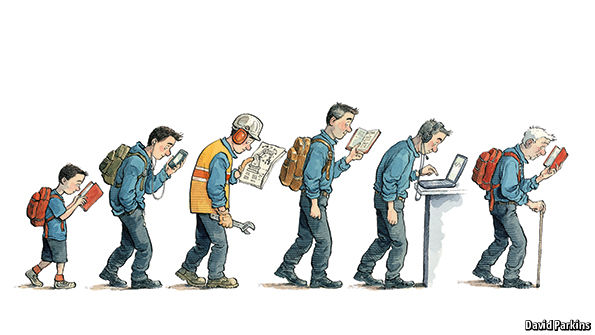Learning and earning: Equipping people to stay ahead of technological change
Learning and earning
Equipping people to stay ahead of technological change
from The Economist
The combination of education and innovation led to a remarkable flowering of prosperity.
Working lives are so lengthy and so fast-changing that people must be able to acquire new skills throughout their careers.
The lifelong learning that exists today mainly benefits high achievers and is therefore more likely to exacerbate inequality.
The classic model of education is breaking down. One reason is the need for new and constantly updated skills.
Pushing people into ever-higher levels of formal education at the start of their lives is not the way to cope.
On-the-job training is shrinking. Self-employment is spreading. But taking time out later in life to pursue a qualification is not easy.
Massive open online courses (MOOCs) offer cheap, short programmes that make their students more employable.
Online learning requires some IT literacy, yet one in four adults in the OECD has no or limited experience of computers.
If new ways of learning are to help those who need them most, policymakers should be aiming for something far more radical.
A curriculum needs to teach children how to study and think. Which will make them better at picking up skills later in life.
The biggest change is to make adult learning accessible to all. One way is for citizens to receive vouchers that they can use for training.
Industry can help by steering people towards the skills it wants and by working with MOOCs and colleges to design courses that are relevant.
Governments need to slash the licensing requirements and other barriers that make it hard for newcomers to enter occupations.
To keep the numbers of those left behind to a minimum, all adults must have access to flexible, affordable training.


